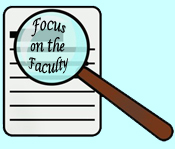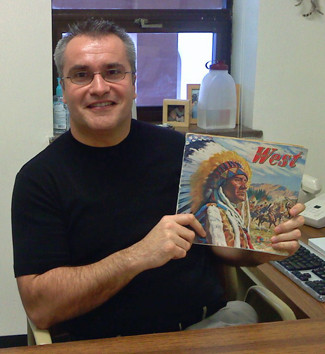Department of History


As you walk into Professor Christophe Boucher's office, your eyes first catch glimpse of a map of the United States. As you look closer you instantly see images of Native Americans covering the map.
"There is a lot to know about Native Americans." says Boucher as his eyes gleamed with excitement.
When you take a seat in front of his desk, you see the two dream catchers hung upon his office wall. Originating from the Ojibwa Nation, a dream catcher's purpose is to keep away bad dreams. It is also considered to some as a symbol of unity among Indian Nations. As one of the dream catchers danced upon the office wall behind Boucher, he began to tell his story about his interest in Native American history.
At age 7, Boucher grew up watching cowboy and Indian television programs in France. Boucher was bothered that Indians were always the bad the guys in the shows. His interest in American Indians grew when his parents bought him a book about Indian history. The book, "West," started Boucher's interest in Native American cultures and history where it has led to his grown up passion to teaching American Indian history at the College of Charleston.
Many of Boucher's teachings have developed from his broad background of culture. Boucher acquired his undergraduate degree in France, where he studied English. He was then required to study abroad in the United States. He chose to study at Montana State University which has one of the best American Indian Studies programs in the nation. These studies fueled his childhood passion, which is still present today. Boucher then moved on to the University of Kansas where he completed a master's degree and doctorate.
Boucher has tremendous enthusiasm for broadening the education of College of Charleston students about American Indians. At the College, he teaches courses in the history of the American West History and in Western Civilization.
Fellow Charleston history professor Edmund Drago commends Boucher's work, "Boucher is a creative and hardworking person who has made the history department more multicultural. He takes things from different points of view. He uses PowerPoint to engage the students by using animation and cartoons in his slides."
Boucher is currently working on a textbook on Native American history north of the Rio Grande to 1677. In addition, Boucher is finishing a book project on the Wyandots, a Northern Iroquoian people who deeply influenced the history of the Great Lakes region.
"American Indians are a subject in history that is commonly overlooked, even by teachers. There is a common stereotypical misconception about Indians, which was apparent to Boucher even when he was a child. American Indians are erroneously portrayed to be "lazy" or "savages," explained Boucher.
"I want people to question the cultural misunderstandings they have about American Indians," Boucher says. "My role is to explain Native American actions in the context of their cultural expectations. They were not savages who behaved in an irrational way. Their behavior and historical choices were deeply rooted in their cultural norms. Once you understand these norms, Native American actions become understandable and predictable."
Boucher not only teaches Native Americans history inside the classroom, but also around the Charleston community. In November 2009, Boucher contributed his work to the Native American Expo with the Native Americans in the Charleston area. The Second annual Native American Expo took place in November of 2009 at Charles Town Landing. It featured workshops in Native American history, Native American storytellers, American Indian dancers, and crafts. The Native American Expo is sponsored by the Morgan Allen Platt Foundation. As a non-profit organization, its mission is to research, educate, and archive artifacts and historical documents to honor the historical and contemporary contributions of American Indians in South Carolina.
Boucher's role in the community as well as inside the classroom is to contribute his research and studies of the Native Americans so people understand more about their cultures. Boucher clarifies cultural misunderstandings and increases the knowledge of American Indians to his students and peers. For more information on Boucher's studies, please contact him at boucherc@cofc.edu.
###
Laura Vyskocil contributed to this article (Spring 2006)